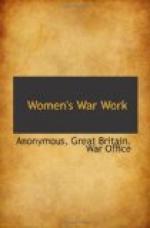The Committee was composed of five Peers and twenty-seven members of the House of Commons, and started its work in October, 1916, and in its report, April, 1917, it recommended, by a majority, that a measure of enfranchisement should be given to women.
The National Union of Women’s Suffrage Societies and the Consultative Committee, which had been formed in 1916 by the N.U.W.S.S., of representatives of all constitutional societies, presented various memorials, notably an admirable memorandum of women’s work and opinion in favour, prepared by the National Union for the Speakers’ Conference during its sittings. After its recommendations while the bill was being drafted, Mrs. Henry Fawcett, LL.D., the President of the N.U.W.S.S., headed a deputation received by the Premier, Mr. Lloyd George, who has always been a supporter of Women’s Suffrage. This was certainly one of the most representative and interesting deputations that ever went to Downing Street. It numbered over fifty and every woman in it represented a great section of industrial and war workers—Miss Mary MacArthur, the Trade Union Leader was there, and Miss Margaret Bondfield, Mrs. Flora Annie Steele, the authoress; Lady Forbes Robertson, for actresses; Miss Adelaide Anderson, our Chief Women Factory Inspector; Mrs. Oliver Strachey, Parliamentary Honourable Secretary of the National Union, whose work has been tireless and invaluable in the House; a woman munition worker, a woman conductor, a railway woman worker, a woman chemist, a woman from a bank, a clerk, a shipyard worker, a nurse, a V.A.D., an eminent woman Doctor, a peeress in Lady Cowdray, who has done so much for the British Women’s Hospitals and so many other war objects, and women representatives of every calling in the nation at peace and war. Mrs. Pankhurst, who has been very active in war work, was also present on the Premier’s invitation, and Mrs. Fawcett brought a Welshwoman who made her plea in her own language, the Premier’s own, too, and the one he loves to hear. In his reply, he assured them the bill would contain a measure of enfranchisement for women as drafted, and he was quite sure the House would carry it.




